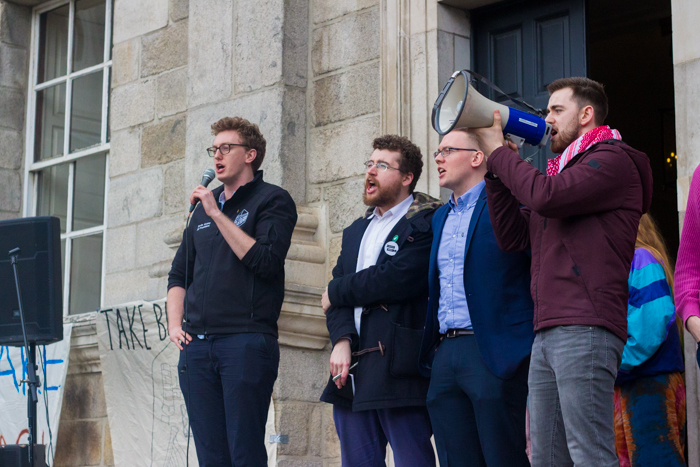The last few weeks have been incredibly empowering. In the space of a month, we have gone from the shock of a €450 flat fee for supplementals to the euphoria of their complete removal. Fee certainty for non-EU students and all postgrads now exists, combined with the reversal of huge increases in accommodation rates. We have seen some of the most radical direct action this campus has experienced in decades. We, a collective of students, have struck a very meaningful blow for the student movement.
I would like to address what needs to come next. This movement needs to be far bigger than one special month in Trinity. It needs to extend its view beyond Trinity issues and address the root cause of all regressive and detrimental fees, such as the ones we avoided this month: higher education is chronically underfunded nationally. That is not a new thought, or a radical one. This is universally accepted across the political spectrum. The only question is: how do we fix it?
It needs to extend its view beyond Trinity issues and address the root cause of all regressive and detrimental fees
I don’t intend to go into too much detail on the Cassells report, or the benefits of publicly funded education for students. That is an entire article in itself, and it has been written many times before. The report provided three options for the future of higher education and was very clear: regardless of the model chosen, the status quo could not continue. Yet here we are, almost two years later, in the same limbo as we were before the report was published. In the interim, our universities are suffering constant reductions in funding. It is not a stretch to say that Trinity will struggle to keep the lights on in a few years, if nothing is done.
We’re here because of a complete deficit in willingness to take bold action of any kind. The debate around higher education funding has been characterised, in my experience, by a sense of paralysis. All the voices in the conversation are guilty of that inertia. The student movement across the country has played by the rules for far too long. On a local level, we have been sucked into suffocation by subcommittee, a game in which seasoned college officers have an inherent advantage. Nationally, we have been guilty of reducing our activism to one (albeit impressive) show of force every October, in the form of the March for Education.
Our universities are equally culpable. By complaining of reduced funding and immediately turning to students to remedy that reduction, our universities fail us. They facilitate the government’s inaction by papering over the funding holes with student money. It is completely illegitimate for university management to point us towards the government as the source of our problems, with a shrug of the shoulders. Universities should be moving in lockstep with their students, publicly and unequivocally demanding publicly funded education. Until universities publicly endorse and lobby for publicly funded education, the government of the day will have a free pass to continue to sit on their hands.
Until universities publicly endorse and lobby for publicly funded education, the government of the day will have a free pass to continue to sit on their hands.
Take Back Trinity has earned the first real victory for students in the funding battle in quite some time. Within the walls of Trinity, it is almost unheard of for the Board to reverse its own decision in such stunningly public fashion. It is an achievement of which everyone involved, from occupiers to those who liked statuses on Facebook, should be immensely proud.
For the movement to continue and spread beyond the walls of Trinity, we need to bottle the spirit of the campaign. We won because we mobilised. We won because we weren’t afraid to play outside the rules. The iron spirit of occupation and radical disruption brought us this, the first of many necessary victories. For more victories to follow, we need to consolidate and grow. Those who didn’t engage at all this time need to recognise that this battle is for us all, and that it can’t be won by a dedicated few on their own. Those who supported online need to step out and join us on the streets next time. Those who occupied need to continue to lead by example, and maintain focus and motivation on what could be a long and arduous road.
It is an axiomatic truth that if you are going to negotiate, you should do so from a position of strength. Over the last few weeks, we claimed the position of ultimate strength. We showed that when students choose to remove their co-operation, it is within our power to shut this university down. It’s time now to take that strength to the national stage. Our position is clear: education is a public good and should be publicly funded. Maybe our government needs to be shown that when students aren’t listened to, we can shut down far more than just the Book of Kells.
Kevin Keane is the President of Trinity College Dublin Students’ Union.







